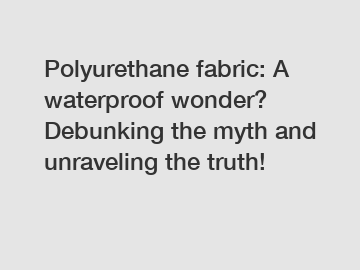Polyurethane fabric: A waterproof wonder? Debunking the myth and unraveling the truth!
Polyurethane fabric: A waterproof wonder? Debunking the myth and unraveling the truth!
Polyurethane fabric, commonly known as PU fabric, has gained popularity in recent years due to its claimed waterproof properties. Many people have turned to this fabric for its ability to repel water and keep them dry. However, there have been debates and concerns about whether polyurethane fabric can truly live up to its reputation as a waterproof wonder. In this article, we will debunk the myth surrounding polyurethane fabric and uncover the truth behind its waterproof capabilities.
Understanding Polyurethane Fabric:

Polyurethane fabric is a synthetic material made by coating a woven fabric, such as polyester or nylon, with a layer of polyurethane. This coating gives the fabric its waterproof properties and enhances its ability to repel water. Polyurethane fabric is often used in outdoor gear and clothing, including raincoats, backpacks, and shoes.
Debunking the Myth:
While polyurethane fabric does offer some level of water resistance, it is important to understand that it is not completely waterproof. This is a common misconception that needs to be clarified. When exposed to heavy rain or prolonged exposure to water, polyurethane fabric can, in fact, absorb water and become saturated. It is crucial to differentiate between water resistance and complete waterproofness when considering the use of polyurethane fabric.
Understanding Water Resistance:
Water resistance refers to the fabric's ability to resist water penetration to some extent. Polyurethane fabric excels in water resistance, as the polyurethane coating creates a barrier that repels water droplets. This makes it ideal for light rain or short periods of exposure to water. However, it is important to note that extended exposure to water or heavy rain can eventually cause water to seep through the fabric.
Reality Check - Unraveling the Truth:
To truly understand the limitations of polyurethane fabric, it is essential to consider its breathability, durability, and maintenance requirements. While the polyurethane coating repels water, it can also trap heat and moisture, reducing breathability and causing discomfort. This can be problematic, especially for active individuals or in warmer climates.
Furthermore, the durability of polyurethane fabric can be compromised over time, especially with frequent use or exposure to harsh conditions. The coating may wear off or become damaged, reducing the fabric's water resistance abilities. Regular maintenance and reapplication of waterproofing agents may be necessary to maintain the fabric's performance.
Conclusion:
Polyurethane fabric possesses water resistance capabilities, making it suitable for many everyday uses. However, it is crucial not to mistake water resistance for complete waterproofness. The myth surrounding polyurethane fabric as a waterproof wonder is debunked, and its limitations are now unveiled. It is important to consider the fabric's breathability, durability, and maintenance requirements when deciding to use polyurethane fabric for waterproof purposes.
If you have any further questions or would like to learn more about polyurethane fabric, please feel free to contact us.
For more wholesale raincoats, fleece jacket bulk, baby swimwear uv protectioninformation, please contact us. We will provide professional answers.


